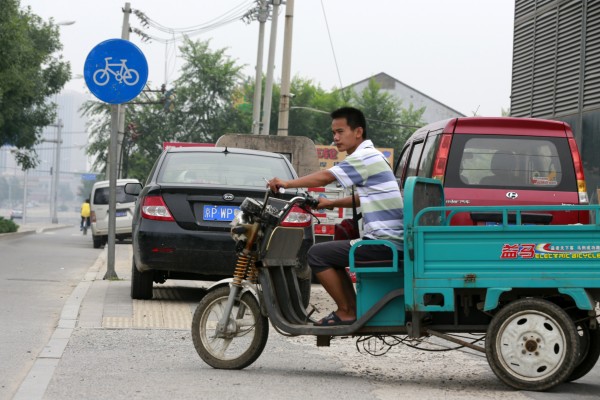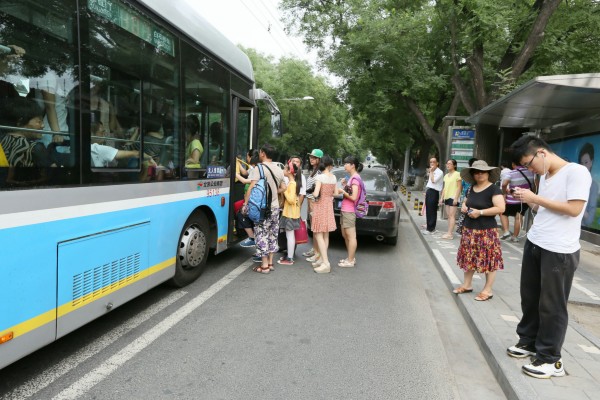

|
 Disorderly parking on the sidewalk is a common problem in big cities, especially Beijing and Shanghai. Feng Yongbin / China Daily |
|
 Parking in inappropriate places, such as bus lanes, often results in traffic jams in downtown Beijing. Provided to China Daily |

Poor management and bogus fee collectors add to the problem, report Cao Yin and Zhang Yuchen in Beijing, and Wang Ying in Shanghai.
He Xiaobei, 25, is always frustrated when he drives in downtown Beijing. He is worried about parking because it can often take 15 minutes or longer to find a space.
On a recent trip, it took him more than 30 minutes to find a space on Gulou Dajie in Xicheng district. The fee, 15 yuan ($2.45) for 15 minutes, drove him crazy too.
There is no fixed citywide tariff and different areas charge differently.
"You would not believe how many times I drove around in circles, desperate for a parking place," he said. "Many people just leave their cars on the side of the road, but I'm wary of doing that because it is against the law. I was once fined 200 yuan for doing that."
"The convenience of parking has become my first consideration when I drive, especially on the weekends," he said.
He is just one Beijing resident concerned about the lack of parking spaces as a result of the massive increase in vehicle ownership in recent years.
By March 2012, around 5 million autos had been registered with the municipal government of Beijing. However, the number of parking spaces is only 2.48 million, according to a joint report by Beijing University of Technology and the Chinese Academy of Social Sciences, which noted that the capital needs another 2.5 million spaces in the inner-city areas to meet the rising demand.
The report noted that three types of parking sites are currently in use in Chinese cities: Specially built lots in shopping centers, railway stations, airports and other large buildings; off-road public parking lots; and parking either on the side of the road or on the sidewalk.
"The on-the-road or pavement parking areas are the source of most of the parking-related problems in the city, such as arbitrary charges and disorderly parking, but the companies that manage the spaces are not the only ones at fault," said Ding Limin, a professor who specializes in traffic safety at Chinese People's Public Security University.
The problems, including the rise of bogus wardens who charge drivers illegally and the use of fake parking fee invoices, require more action from the government. "Parking is a public service, and the government should devote more time and resources to it. It should be handled like public transport," said Ding.
Confusion reigns
A development plan for Beijing will see the establishment of 280,000 more parking spaces of all kinds in a bid to alleviate the difficulties faced by drivers, said the report.
Tang Di, a supervisor of parking lot services in the city's Haidian district, said the number of spaces in the city is far from sufficient and urged the government to clearly identify the areas where parking is allowed to avoid confusion.
"The establishment of new parking areas is a slow process and doesn't satisfy demand. In addition, many drivers have no idea which areas are legal parking lots because some of the street signs are difficult to see," said Tang, who noted that the situation provides opportunities for illegal charging and disrupts the use of parking lots.
A list of the location of legal parking lots and the fees is available on the website of the Beijing Municipal Commission of Transport. In theory, drivers simply have to enter the name or area code of the place they plan to visit to discover the location of lots and the local fees.
In reality, very few drivers take advantage of the site, according to Tang.
"After all, most people don't search for parking lots before they set off," he said.
In recent years, so-called multi-layered parking lots, where cars are stacked by hydraulic lift, have been used in many old communities, including the hutong, the narrow alleys that crisscross Beijing, and lanes, "but the maintenance fees are too high," said Tang, adding that the fees are the main reason the technology has failed to develop as expected.
Wang Yan, an officer responsible for the management of wardens employed by Jinganda Parking Co, echoed Tang's comments, saying that the poorly labeled parking sites also confuse her employees.
"We provide regular training and tests for the wardens and ask them to wear their uniforms and display their ID cards, but we can't ensure that every one of them abides by the regulations and charges drivers the correct amount," said Wang, whose company employs more than 30 wardens.
"We can't supervise them (the wardens) all day, every day, so we can't exclude the possibility of people asking for extra parking fees in unregulated areas, where the municipal commission doesn't make it clear if parking is allowed," she explained.
Shi Xiangqian, a warden responsible for spaces on Huixin Dongjie in Beijing's Chaoyang district, admitted that he doesn't know the standard fee for the area and said that he sometimes reduces the charge for drivers he meets regularly, while upping the rate for newcomers.
"If drivers park their car for the entire day, I charge 15 yuan or 20 yuan, but sometimes I give up charging after 8 pm because I don't have time to wait around for drivers to return to their cars," said Shi, who earns 3,000 yuan a month.
Wang Bing works on a stretch of road roughly 100 meters from Shi's. He charges drivers 9 yuan per hour, but said he is powerless to act if they refuse to pay.
"Sometimes we've even had disputes with car owners who claimed that we have damaged their cars and used that as an excuse not to pay," he said.
Bogus wardens
In addition to these issues, new problems have arisen recently, such as bogus wardens who issue fake parking fee receipts that unscrupulous drivers use to make money from their company expense accounts, said Liu Xuming, a prosecutor in Dongcheng district.
Between January and June, Dongcheng district dealt with the six cases of people suspected of either masquerading as wardens or of using fake receipts. One of the suspects, a man surnamed Zhu, is accused of illegally charging drivers in the area around Hepingli Hospital in Chaoyang district. He netted almost 3,000 yuan during a two-week period, much more than his monthly salary, according to Liu.
In the past, misdemeanors such as this were punished by fines, but a recent change in the law means those who pose as wardens or who produce and sell fake invoices in amounts of more than 100, or to the sum of 400,000 yuan and more, face two years in prison.
Li Long, another prosecutor in the authority, said wardens should hand in invoice fees to their companies, but they will make more money at little cost if they buy fakes.
In one case, a man bought 200 fake invoices at 25 yuan each. However, the face value was 500 yuan, so he made 475 yuan every time he presented one of the receipts, said Li.
However, collecting evidence of wrongdoing is difficult, said Zhou Zhijun, a prosecutor at the Chaoyang investigation department.
"So many people park cars every day, it's hard to work out who is buying the fake receipts or how many have been sold," said Zhou. "Sometime we catch people red-handed, but they usually only carry a small number of receipts and that makes it difficult to prosecute them."
Zhou and Li suggested that point-of-sale machines should be used to collect parking fees; drivers could either swipe a prepaid card or use a credit card to pay, thus reducing the incidence of fraud and lowering the cost of hiring so many wardens.
However, Wang said the plan would be impractical "because the companies would have to invest a large amount to establish the system and monitoring the machines would take up too much time."
Coordinating authority
Zhu Tao, a lecturer at the school of sociology at Beijing University of Technology, said an overall coordinating authority should be established to tackle the capital's parking problems.
"There's a lack of focused management, and governance is weak. The municipal government should think about giving power to a parking authority that could handle all the issues such as planning, building and pricing the lots, plus regulating and managing all the facilities and their use," he said. Zhu suggested that the city government could learn from the experiences of other large cities, both in China and overseas.
Shanghai, one of China's largest municipalities, is also exploring developments in the field of parking.
By June 2012, the city had 389,000 parking lots, providing space for 80 million cars annually, according to Zhou Huai, deputy director of the Shanghai Transportation and Harbor Administration at a media briefing held by the local government.
To improve the efficiency of public parking lots, the city has set up 267 information boards in the downtown districts of Huangpu, Xuhui, Jing'an, Changning and Yangpu. The boards provide drivers with information about the availability, location and fees of 193 parking lots in those areas, said Zhou.
The city will also add more than 10,000 parking spaces this year. They will be located in residential areas and close to hospitals and schools, according to the news portal People, which cited the Shanghai Static Traffic Management Work Conference.
In Beijing, the State-run Beijing Gonglian Co is the biggest player in the field of parking management, far overshadowing its rivals. That's an unhealthy situation, according to Ding.
"A lack of efficient competition in the market and an unfair pricing system means the parking business in Beijing is in poor shape," he said. Ding urged greater competition among parking-management companies and also suggested that communities and government departments should allow drivers to rent prepaid parking spaces that are unoccupied during the day when their owners are at work: "In this way, the pressure on the side-of-the-road parking areas would be alleviated, and we could make full use of these temporarily unoccupied spaces."
Contact the writers at caoyin@chinadaily.com.cn and zhangyuchen@chinadaily.com.cn